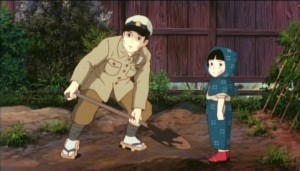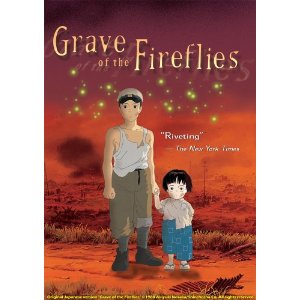Editor’s Note:
In light of the tragic earthquake and tsunami in Japan, cinematic essentials looks back at one of the most devastating animated films of all time. If you are not well acquainted with the Japanese film industry, there is no better time than now. From Kurosawa and Ozu to Miyazaki and J-horror, there is something for everyone within the Japanese filmography. Grave of the Firelflies is one of the best Japanese films, but more than that it is a reminder of how we should and should not treat one another during difficult times. If you would like to donate to the Japanese relief efforts, please click here.https://american.redcross.org/site/Donation2?idb=0&5052.donation=form1&df_id=5052
——————————————————————————————————————————————————————————————–
Grave of the Fireflies absolutely destroyed me. Every minute of it filled me with dread and sadness. It touches upon the dark side of life, showing cruelty, alienation, and loss. It evokes the emotions that we spend most of our lives trying to avoid. And it should be required viewing for every parent.
The Japanese movie follows Seita, a boy of 14 and his 4 year old sister, Setsuko, during the waning days of World War II. It is animated, but it is not for children. Young kids should stay away, not because the images are overtly violent or disturbing, rather the emotions are beyond their comprehension.
“All war stories are told by survivors,” the director Samuel Fuller once told Roger Ebert. This is a survival tale as well, but we know within the first few minutes that the children will not survive. The reasons why the children do not survive make this film vital. In most films where the audience knows the main character will die, it becomes increasingly suspenseful as the movie progresses. By the end, we are primed for the moment when the gun goes off, or the accident occurs. This film offers no easy tragic ending. Death does not come from a wayward bomb, but from an accumulation of the little acts of selfishness that we commit in our everyday lives.
 How often do we put conditions on the love we give one another? How often do we agree to do something out of obligation and complain about it later? Early in the film, the children lose their mother and move in with an aunt. While she accepts them into her home, she refuses to comfort the little girl’s nightmares, belittles the boy for not doing more for the war effort, and doles out meal portions based upon her judgment of who deserves it most. Despite this, she is no wicked step-mother. She is trying to survive as well. Like most of us, she may not even realize that she judges and makes her love conditional.
How often do we put conditions on the love we give one another? How often do we agree to do something out of obligation and complain about it later? Early in the film, the children lose their mother and move in with an aunt. While she accepts them into her home, she refuses to comfort the little girl’s nightmares, belittles the boy for not doing more for the war effort, and doles out meal portions based upon her judgment of who deserves it most. Despite this, she is no wicked step-mother. She is trying to survive as well. Like most of us, she may not even realize that she judges and makes her love conditional.
The children end up alone, forgotten by the world. Adult selfishness drove them out on their own, but it is childish ego that keeps them there. The boy refuses to forgive his aunt for her behavior even when their situation becomes so dire that her help is their only hope for survival. The children spiral downward and all the audience can do is watch as if they are attending a terminally ill relative. The saddest part is the knowledge that it is all preventable. All it would take is one person to show compassion to the children or the boy to let go of his ego.
It is difficult for me to connect to a war movie. I have never lived through a war, so my knowledge comes from the history books and the movies. Great war movies give you a simulated experience. But even the best examples, such as the visceral opening invasion of Saving Private Ryan or the brutal imagery of Schindler’s List will never aptly capture  the reality. The most affecting scene about World War II comes from The Straight Story, when two elderly men sit at a bar and tell their war stories. Both men end the scene crying, overwhelmed by their memories. The beauty of the scene is its encapsulation of the repercussions of war without focusing on the actions, but rather the feelings.
the reality. The most affecting scene about World War II comes from The Straight Story, when two elderly men sit at a bar and tell their war stories. Both men end the scene crying, overwhelmed by their memories. The beauty of the scene is its encapsulation of the repercussions of war without focusing on the actions, but rather the feelings.
The emotional impact of Grave of the Fireflies continues to resonate with me weeks after my first viewing. It has become a touchstone. It reminds me to be a little kinder, that little actions can have huge repercussions, and to hug my children as much as I can. There are so many scenes in this film that had me close to tears. When writing this essay, there were times when I felt a pit in my stomach, choked up from memories of the film. This does not happen often.
Grave of the Fireflies may not be a pleasant emotional experience, but it is powerful and unforgettable. As parents, we want to teach our kids to be thankful for what they have and to help those in need. We want them to be compassionate and to remember those who are forgotten by society. The movie reminds us of the tragic consequences that can occur if we ignore these ideals. Show it your children as they become old enough, but before that, watch it yourself and remember what is important in life.
Grave of the Fireflies Trailer
Dave Umbricht loves his family, movies and the NBA (in that order). His unexplainable, genetic attraction to movies flourished in the early ’80s thanks to Siskel and Ebert. It’s also believed Dave was the only 8-year-old to know of My Dinner with Andre, even though he didn’t see it until he was 28. In the ’90s he wrote three awful screenplays, including next summer’s Cowboys and Aliens (or at least a script with the same title). He still can’t dunk a basketball.
